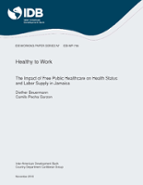Healthy to Work: The Impact of Free Public Healthcare on Health Status and Labor Supply in Jamaica
Date
Nov 2016
This study examines whether Jamaica's free public healthcare policy affectedhealth status and labor supply of adult individuals. It compares outcomes of
adults without health insurance versus their insured counterparts, before and
after policy implementation. The study finds that the policy reduced both the
likelihood of suffering illnesses with associated lost work days and the number of lost days due to illnesses by 28.6 percent and 34 percent, respectively. Consistent with the absence of "employment lock", no effects are found on employment at the extensive margin. However, consistent with a reduced number of days lost due to illnesses, there is a positive effect of 2.15 additional weekly labor hours. This is primarily a labor supply effect as the study shows that both reported and imputed hourly wages decreased by 0.15 and 0.06 log-points respectively. Back-of-the-envelope calculations suggest that the policy added a yearly average of US$PPP 26.6 million worth of net real production to the economy during the period 2008-12.
adults without health insurance versus their insured counterparts, before and
after policy implementation. The study finds that the policy reduced both the
likelihood of suffering illnesses with associated lost work days and the number of lost days due to illnesses by 28.6 percent and 34 percent, respectively. Consistent with the absence of "employment lock", no effects are found on employment at the extensive margin. However, consistent with a reduced number of days lost due to illnesses, there is a positive effect of 2.15 additional weekly labor hours. This is primarily a labor supply effect as the study shows that both reported and imputed hourly wages decreased by 0.15 and 0.06 log-points respectively. Back-of-the-envelope calculations suggest that the policy added a yearly average of US$PPP 26.6 million worth of net real production to the economy during the period 2008-12.




